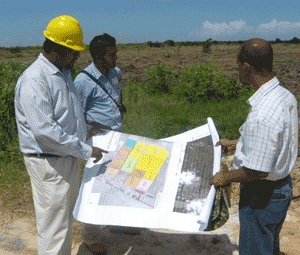THE People’s Progressive Party/Civic (PPP/C) has worked assiduously over the past 20 years to develop Guyana’s economic position. And as a result, there have been sweeping developments in all the sectors of economy, particularly the housing sector.
 The evolution of the housing sector in Guyana has been an amazing journey which has resulted in the opening up of housing areas in every single region, and has provided the opportunity for home ownership, and the building of equity to citizens across the country.
The evolution of the housing sector in Guyana has been an amazing journey which has resulted in the opening up of housing areas in every single region, and has provided the opportunity for home ownership, and the building of equity to citizens across the country.
“If you look at the 1980’s and the early 1990’s you would see that we had nothing like a housing programme; and as a result, we had an explosion of squatter settlements across the country. Looking at the numbers, we had 86,000 persons whose lives were threatened because of the circumstances under which they were living. We have transformed that over the last two decades,” the Housing and Water Minister, Irfaan Ali, stated.
According to Ali, the housing story goes beyond the allocation of house lots, and tells a story of the expanding services sector.
“The housing programme in Guyana has been a tremendous success. The allocation of house lots is the impetus for many additional transformations in the lives of individuals, and by extension, the society; in so doing, the sector itself contributes significantly to the growth of the economy,” Minister Ali outlined.
Testimony to the successes of the housing policies and programmes initiated under the current administration, is that more than 86,000 persons now have equity because they now own land and are then able to access loans; these are persons who would have previously resided in squatter settlements that have now been regularized.
As to the implications of this, the Housing Minister explained, “91% of the squatter settlements have been regularized. Those persons will now have an opportunity to use that title or transport to enhance their living conditions and standards by opening up new economic frontiers. The i nfrastructure to support this is now in place; there are now better roads, schools, health centres and other such infrastructure that is all linked to national development.”
nfrastructure to support this is now in place; there are now better roads, schools, health centres and other such infrastructure that is all linked to national development.”
To build on this booming sector, this year, the Housing Ministry pledged to have a further 6,500 house lots and 4,000 land titles distributed, and to ensure that the vision for the sector is achieved.
In addition to the allocation of lots, 200 core houses will be made available to under-privileged families, while the programme for professional groups will provide 200 teachers, nurses and policemen with fast track access to loans for home construction.
Alluding to other successful housing initiatives, Ali said, “To ensure greater access to affordable housing, we have established a turnkey housing initiative which seeks to minimise the time taken between allocation, loan application and construction, by immediately providing two- bedroom houses to an additional 80 families by the end of the year.”
As to the motivation behind the thrust to provide 100% access to housing, Minister Ali noted that it goes well beyond the dimension of the economy and the owning of a house, and seeks to enhance self-esteem and family life.
He said, “When families are closely knit and their quality of life improves, it creates less social issues for society. I want to emphasise the importance of building self-esteem and confidence levels which result in more productive citizens in and out of the country. They, in turn, will be able to contribute to the overall transformation that is taking place.”
Beyond Allocation
Minister Ali maintained that his ministry and the Central Housing and Planning Authority (CHPA) will continue to partner with private sector companies, to ensure citizens move beyond allocation of lots to home ownership.
In so doing, agreements have been made with several companies, including Trinidad Cement Limited (TCL), Toolsie Persaud Limited (TPL) and National Hardware Limited (NHL) to benefit low and moderate income Guyanese in their quest to build their homes.
Ali pointed out that these arrangements will have tremendous positive impacts on ordinary Guyanese, and is an excellent example of the partnership between the housing and private sectors in advancing a product that is sustainable and in ensuring programmes are tailored to reach every segment of society.
“We will continue to collaborate with private sector organisations in developing programmes that are aimed at bringing greater benefits to land allottees and to ensure that the market pricing mechanism does not pose additional burdens on them in the construction of their home,” Minister Ali stressed.
Strengthening the Sector
Despite the success of the housing programme and the continued investment in the sector, the Housing Minister stressed the need to be “guarded” in the approach to the continued growth and development of the sector, the areas of focus and the various macro economics and fiscal policies that govern the development of this sector.
In ensuring this, a draft National Housing Policy formed part of the CHPA’s aim of giving clear policy directions to future development of housing in Guyana.
The draft document contains proposals for application for areas of constraints in the housing development in Guyana. Macro economics and housing, demographic and housing trends, land management and marketing in Guyana, housing subsidies and the construction sector, with emphasis on standards, building codes and quality of building materials are central among the issues the document seeks to provide guidelines for.
A copy was presented to stakeholders and a consultation session was held last Friday to ensure their full appraisal and participation to allow for “transparency, openness and consultative mechanism through which to advance the housing programme in Guyana.”
The minister said that the intention is to “implement the policy and all its recommendations so that the housing sector can be protected and sustained and continue to grow.”
The goal of the consultation, he said, was to find “common ground” on the development of the document.
The distribution of 30,000 new house lots by 2015, a remigrants’ housing scheme and other special programmes for young professionals and single persons are among some of the plans of the Ministry of Housing for the next five years.



.jpg)








